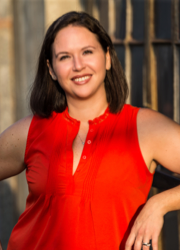This fall The Montessori School of Winston-Salem, TMS, launched their new adolescent program, which includes the opening of their new North Campus and an expansion into grades seven through nine. This is an exciting milestone and a special time for TMS, as they realize a dream and vision that has been in place for several years.
For 45 years, The Montessori School has been providing students in Winston-Salem with a unique educational experience. Though it has grown to include new programs and has had several different homes over the years, TMS has been on Holder Road since 2006. What has not changed is the commitment to provide an excellent Montessori education in a secure, nurturing environment.
The Montessori Method
The Montessori Method of learning was developed by Dr. Maria Montessori and began in 1897. Based on her scientific observations of children, Dr. Montessori developed a responsive approach to education centered on the specific and changing developmental needs of children as they grow. Each age-program is intentionally designed so that children and adolescents are able to be active participants in their own learning in an environment that is set up to be supportive and prepared for learning, and with responsive guidance from highly skilled teachers. The aim is to foster each child’s growth physically, socially, emotionally and cognitively. Some of the key elements that make this method unique include:
● Multi-age classrooms (typically 3-yr. age spans);
● Self-initiated and adult guided play and learning;
● Sensory-focused education with the use of manipulatives;
● A profound connection to nature;
● Purposely designed materials, organized thoughtfully on the level of the child;
● Extension of classroom environments into outdoor space, and using nature to educate;
● Trained teachers observing and guiding students through the process of learning.
The Montessori School of Winston-Salem at a Glance:
The Toddler Program
● For children eighteen months to three years old.
● Developmental focuses include gross and fine motor skills, concentration, self-care (toileting), language acquisition, early socialization.
● This program is offered five days a week, half-day or full-day.
Children’s House Program
● For children ages three to six years old.
● Developmental focuses include fine and gross motor skills, physical independence/care of self, sensory enhancement, mathematics, language arts, geography, and culture.
● This program is offered five days a week, half-day or full-day; but starting in kindergarten, all students are full-day.
Lower Elementary program
● For ages six to nine, or first to third grade.
● Academic skills are strengthened through hands-on experiences, exploration, and research. It offers a fully integrated curriculum that includes language arts, math, art, geometry, biology, physical education, history, music, geography, Spanish and physical sciences.
Upper Elementary
● For ages nine to 12, or fourth to sixth grade.
● Builds upon the curriculum of the Lower Elementary with a deeper understanding of critical thinking, academic knowledge and skills, communication and personal expression, responsible independence, and social responsibility.
● Both Elementary programs have a focus on community service. Understanding the need to contribute to the larger community becomes an important part of their education that is woven in throughout the year.
The Adolescent Program
The newest program is the Adolescent Program that began this fall by introducing a seventh-grade class. It is a natural progression from the program already being provided. This program will expand each year, adding a grade until they reach the full range of the program in the fall of 2020, with seventh- to ninth-grade students.
Understanding Adolescents
The Adolescent Program at The Montessori School of Winston-Salem was designed to help young adolescents grow socially, emotionally and academically during a transformative time in their lives. Head of School Jonathan Churn discussed the development of the program. “We designed this program, as we do all our programs, around the developmental needs of the students we’re serving. Adolescence is a time of tremendous change in life of young people, and one in which they are looking toward what their role will be in the adult world. While this is a time of great intellectual ability, in order to foster that, academic studies need to be tied to meaningful, substantial work that has value.” This understanding of adolescents led them to the program and space they developed.
New North Campus
It was imperative that this new program would allow adolescents to have authentic opportunities for meaningful work and studies. That was a key factor in the space that would serve as its home. Within walking distance to the main campus, the new North Campus of nearly 7 acres is a unique learning environment that provides these students with the space they need to feel independent from their childhood. Churn continued,
“The goal was to create a safe, cocoon-like environment that is a safe place, set up to provide meaningful connections to the outside world.” The land on the North Campus is key to the program, as it provides opportunities for elements of a working farm that will support the application of the biological and earth science studies and avenues for micro-economy ventures—another distinguishing aspect of a Montessori Adolescent program. The original farmhouse and barn remain on the property and connect it to its history and serve other key aspects of the program. The house serves as a home-like environment to create for students a sense of security and belonging, while providing authentic opportunities for community living. The new building on the North Campus will house several multi-use spaces, including a community room, language arts lab, mathematics lab, science lab, and outdoor classroom. The use of large, moveable doors and windows allows you to get a sense of the amazing connection to nature that this space evokes.
An Integrated Approach to Education through Micro-economies
Education is key when it comes to the Adolescent program. The academic curriculum is comprehensive, responsive and integrated through project work, individual studies and real-world experiences. The scope and sequence of curriculum prepare students not only for rigorous high school studies, but nurture characteristics such as love of learning, critical thinking, and collaboration and communication skills that are critical for success in the 21st century. One of the ways this is done is through small-business ventures, known as micro-economies. Often stemming from work on the land, the real small-business ventures that the students create are guided by the teachers and connected to the local community. The current seventh-grade class has chosen to start planting and tending an organic garden and to raise chickens. Guided by highly trained teachers, they have used a variety of social skills and have applied all areas of the fully integrated curriculum to begin this process. They have made connections with two local farms, are researching and designing the processes and equipment needed, gaining an understanding of the science related to the plants and animals, and working within a budget to reach their goals. One student named Davis maintained, “It’s really fun! I am really excited about the chickens, and I hope one day we could even have pigs.” It is this enthusiasm that is generated by working with micro-economies that keeps the adolescents interested in learning. Cheryl Raymond, Director of Elementary and Adolescent Programs, talked about this integrated approach. “This age group needs relevance to stay connected to learning. The staff and teachers are able to help the student pull in the science, math, and language skills they need to learn and connect them to the hands-on projects they are excited about. In the process, they meet and exceed standards for education and learn so much more about what it means to be part of a community.” This exemplifies what Dr. Montessori meant when she said the method was meant to give children an education for life.
Connecting to the Community and Its History
Another important element of the Adolescent Program is connecting, in a substantive way, to the community. This is done in a variety of ways, including the micro-economies, working and learning alongside local experts and getting to know the people who owned the land before them. These connections provide the students a real sense of the history of the land they now call home, and they allow them to see how they fit into the bigger picture of community and society as a whole.
They are also learning to connect to the community through service. One community service project will be working with the toddlers on the school’s main campus under the guidance of the toddler teachers. This experience is tied directly to their health studies on human development and allows the students to help serve the development of the school’s youngest population while helping them learn a little about themselves As time goes on, they would also like to participate in new project with Second Harvest Food Bank, with which the school has had a long-standing relationship. They hope this will help them serve the community once the gardens and chickens are producing food.
The Montessori School of Winston-Salem is located at 6050 Holder Road in Clemmons. If you would like more information about their school and programs, visit their website at wsmontessori.org. You can also visit their school during their open house, scheduled for February 10th from 2-4PM.























